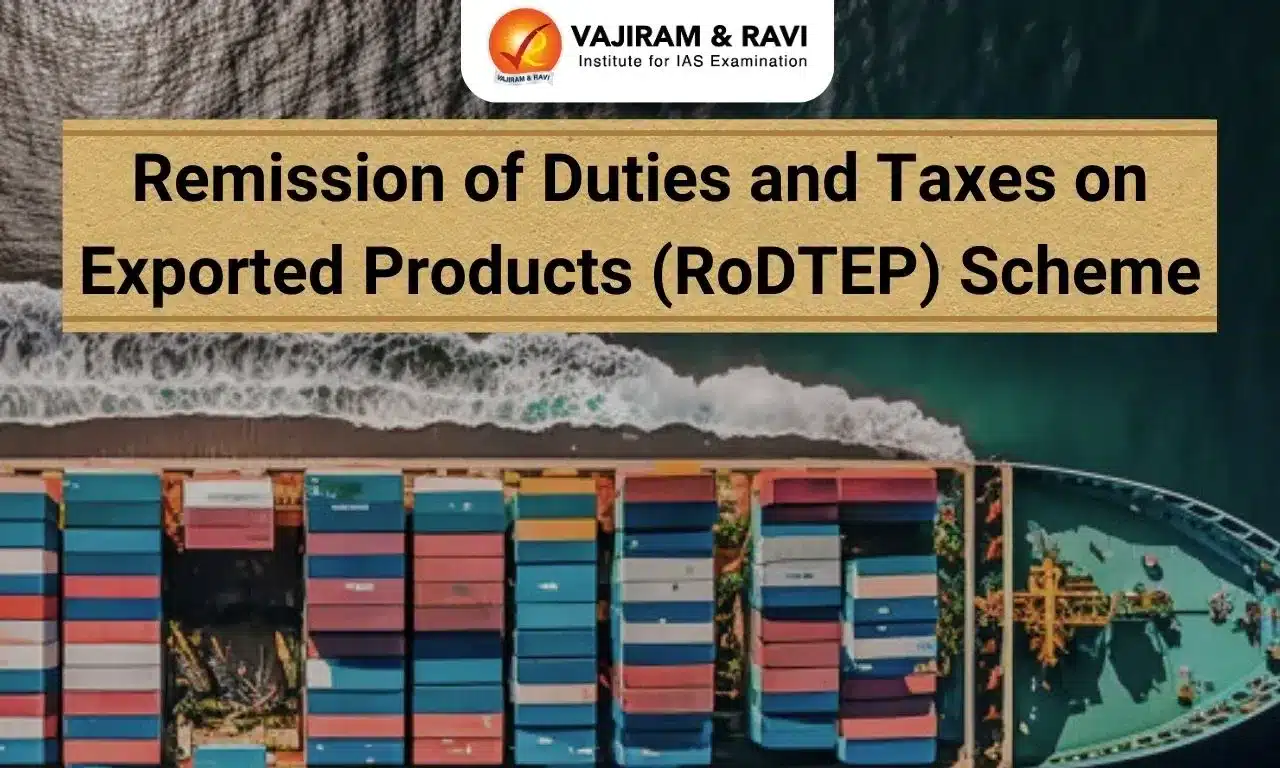Remission of Duties and Taxes on Exported Products (RoDTEP) Scheme Latest News
Recently, the Government of India has announced the restoration of benefits under the Remission of Duties and Taxes on Exported Products (RoDTEP) scheme for exports made by Advance Authorization (AA) holders, Export-Oriented Units (EOUs), and units operating in Special Economic Zones (SEZs).
About Remission of Duties and Taxes on Exported Products (RoDTEP) Scheme
- It was introduced through an amendment to the Foreign Trade Policy 2015-20, and it became effective for exports starting January 1, 2021.
- The primary aim of this scheme is to offset the taxes and duties incurred on exported goods that wouldn’t otherwise be credited, reimbursed, or refunded in any way, and are integrated into the exported goods.
- It is designed to reimburse exporters for embedded duties, taxes, and levies that are not otherwise refunded under any other existing scheme.
- It is compliant with World Trade Organization (WTO) norms and is implemented via a comprehensive end-to-end digital platform to ensure transparency and efficien
- It was enforced to repeal and reduce taxes on exported products, thereby encouraging exports and increasing the number of exports in the country.The scheme will be administered by the Department of Revenue, Ministry of Finance.
- It replaced the Merchandise Export Incentive Scheme (MEIS), in response to the US challenging Indian export subsidies under the MEIS at the WTO.
Tax Reimbursement under RoDTEP Scheme
- The Scheme provides a mechanism for reimbursement of taxes, duties, and levies, which are currently not being refunded under any other mechanism at the central, state, and local levels, but which are incurred by the export entities in the process of manufacture and distribution of exported products.
- This not only includes the direct cost incurred by the exporter but also the prior stage cumulative indirect taxes on goods.
RoDTEP Scheme Eligibility Criteria
- It applies to all the sectors involved in the export of goods, irrespective of their turnover, provided the country of manufacturing of the exported goods should be in India.
- Such an exporter may either be a merchant or a manufacturer exporter. However, such goods should have been directly exported by such a person.
- Labor-intensive sectors that enjoy benefits under the MEIS Scheme will be given a priority.
- Special Economic Zone Units and Export-Oriented Units are also eligible to claim the benefits under this scheme.
- Goods exported through e-commerce platforms are also eligible under this scheme.
Re-Exported Products are not Eligible under this Scheme Process of Refund
- Rebates under the scheme are provided to eligible exporters as a percentage of the freight on board (FOB) value of exports.
- Remission is issued in the form of transferable e-scrips (a type of certificate with some monetary value) maintained in an electronic credit ledger by the CBIC (Central Board of Indirect Taxes and Customs).
- e-scrips can be used for paying basic customs duty on the import of goods or may be transferred electronically to another party.
Re-Exported Products are not Eligible under this Scheme FAQs
Q1: What products are covered under the RoDTEP scheme?
Ans: RoDTEP scheme is notified based on the classification of the products as per tariff heading at 8-digit level. The benefit is given for 8555 tariff items.
Q2: Which products are not eligible for RoDTEP?
Ans: Re-exported products are not eligible under this scheme. To be eligible to avail the benefits of this scheme, the exported products need to have the country of origin as India.
Source: PIB
Last updated on June, 2025
→ UPSC Notification 2025 was released on 22nd January 2025.
→ UPSC Prelims Result 2025 is out now for the CSE held on 25 May 2025.
→ UPSC Prelims Question Paper 2025 and Unofficial Prelims Answer Key 2025 are available now.
→ UPSC Calendar 2026 is released on 15th May, 2025.
→ The UPSC Vacancy 2025 were released 1129, out of which 979 were for UPSC CSE and remaining 150 are for UPSC IFoS.
→ UPSC Mains 2025 will be conducted on 22nd August 2025.
→ UPSC Prelims 2026 will be conducted on 24th May, 2026 & UPSC Mains 2026 will be conducted on 21st August 2026.
→ The UPSC Selection Process is of 3 stages-Prelims, Mains and Interview.
→ UPSC Result 2024 is released with latest UPSC Marksheet 2024. Check Now!
→ UPSC Toppers List 2024 is released now. Shakti Dubey is UPSC AIR 1 2024 Topper.
→ Also check Best IAS Coaching in Delhi
Tags: Prelims Pointers rodtep Scheme upsc current affairs upsc prelims current affairs
























